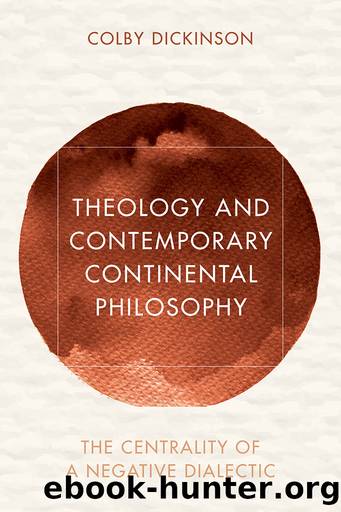Theology and Contemporary Continental Philosophy by Dickinson Colby

Author:Dickinson, Colby
Language: eng
Format: epub
ISBN: 9781786610614
Publisher: Book Network Int'l Limited trading as NBN International (NBNi)
Published: 2018-12-11T10:32:57+00:00
107
Chapter 4
The Phenomenological (Re)turn
The Mystical Double Negation
It would be intriguing to posit something like a shared association between this trio of philosophers—Agamben, Badiou, and Žižek1—with the work of the phenomenologist Jean-Luc Marion, especially as I believe that cementing this relationship, which is not without its uneven spaces, will open up our understanding of the core issues between theology and continental philosophy that much further. In particular, we might locate an initial commonality between the Girardian reconceptualization of sacrifice and Marion’s own rebranding of the term. In Marion’s discussion of sacrifice we can highlight its nonviolent connotations as a form of abandonment and gift—as ultimately a work of mercy aligned with Augustine’s definition as well—alongside his “postmodern” contestation of the frequent ontotheological alignment of God and Being.2 Allowing sacrifice to adopt this resonance, in turn, reflects back upon Marion’s most fundamental concept, that of givenness, which, he makes clear, is made manifest paradoxically through abandonment. This is done in terms that certainly remind us somewhat of the thinkers I had been following a moment ago. Givenness is exemplified through abandonment because what is presented to us through transcendence is invisible and absolute in itself, an indescribable encounter with a phenomena so saturated with an “intuitive overabundance” that our senses are entirely overcome.3 Akin to Descartes’s notion of the infinite or Kant’s notion of the sublime, the “saturated phenomena” becomes an immanent phenomena that yet points toward something beyond the immanent, offering us a chance to discern revelation while yet respecting the suspension of transcendence that the phenomenologist must in the end still maintain.4
108What brings Marion’s considerations of the saturated phenomena, and how the excess located within immanence can yet point toward that which lies beyond it, into line with much of what I have already been pursuing here is that his offered rapprochement between phenomenology and mystical (negative) theologies refuses to concede the subject of theology to a dualistic tension between the positive (kataphatic) and the negative (apophatic).5 What Marion is rather after—and so will bring his vision somewhat more in line with the “negation of negation”—is a “third way” beyond the dualistic impasse, or what he terms a “de-nomination” that draws us away from either naively affirming the name or outrightly rejecting it.6 Following closely the writings of Pseudo-Dionysius (or, simply, Denys), Marion points out how Denys sought to transcend the dualism of affirmation and negation through recourse to de-nomination as a second negation, one that cancels out the first negation. This is what both Marion and Derrida have called elsewhere a de-negation (dénégation):7
It is no longer a question of naming [de Le nommer], nor by contrast of not naming [de ne pas le nommer], but of de-nominating God [de le dé-nommer]—in the twofold sense that this term can have: to name (to name in view of . . . to nominate), but with something close to a negation, and consequently also to undo [Le défaire] from all nomination, to release and deliver God from it [l’en dégager et délivrer], thwarting it [la déjouer pour Lui].
Download
This site does not store any files on its server. We only index and link to content provided by other sites. Please contact the content providers to delete copyright contents if any and email us, we'll remove relevant links or contents immediately.
The Lost Art of Listening by Michael P. Nichols(6472)
Why I Am Not A Calvinist by Dr. Peter S. Ruckman(3769)
The Rosicrucians by Christopher McIntosh(3049)
Wicca: a guide for the solitary practitioner by Scott Cunningham(2704)
Signature in the Cell: DNA and the Evidence for Intelligent Design by Stephen C. Meyer(2500)
Real Sex by Lauren F. Winner(2474)
The Holy Spirit by Billy Graham(2414)
To Light a Sacred Flame by Silver RavenWolf(2353)
The End of Faith by Sam Harris(2287)
The Gnostic Gospels by Pagels Elaine(2026)
Nine Parts of Desire by Geraldine Brooks(2006)
Waking Up by Sam Harris(1958)
Heavens on Earth by Michael Shermer(1954)
Devil, The by Almond Philip C(1899)
Jesus by Paul Johnson(1887)
The God delusion by Richard Dawkins(1848)
Kundalini by Gopi Krishna(1824)
Chosen by God by R. C. Sproul(1759)
The Nature of Consciousness by Rupert Spira(1689)
